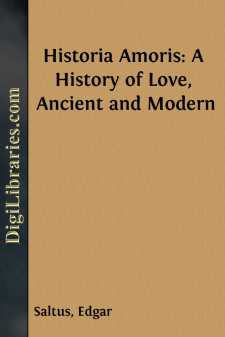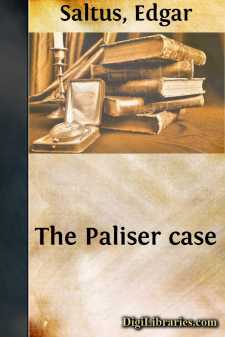Categories
- Antiques & Collectibles 13
- Architecture 36
- Art 48
- Bibles 22
- Biography & Autobiography 813
- Body, Mind & Spirit 142
- Business & Economics 28
- Children's Books 12
- Children's Fiction 9
- Computers 4
- Cooking 94
- Crafts & Hobbies 4
- Drama 346
- Education 46
- Family & Relationships 57
- Fiction 11828
- Games 19
- Gardening 17
- Health & Fitness 34
- History 1377
- House & Home 1
- Humor 147
- Juvenile Fiction 1873
- Juvenile Nonfiction 202
- Language Arts & Disciplines 88
- Law 16
- Literary Collections 686
- Literary Criticism 179
- Mathematics 13
- Medical 41
- Music 40
- Nature 179
- Non-Classifiable 1768
- Performing Arts 7
- Periodicals 1453
- Philosophy 64
- Photography 2
- Poetry 896
- Political Science 203
- Psychology 42
- Reference 154
- Religion 513
- Science 126
- Self-Help 84
- Social Science 81
- Sports & Recreation 34
- Study Aids 3
- Technology & Engineering 59
- Transportation 23
- Travel 463
- True Crime 29
Eden An Episode
by: Edgar Saltus
Description:
Excerpt
It was not until Miss Menemon's engagement to John Usselex was made public that the world in which that young lady moved manifested any interest in her future husband. Then, abruptly, a variety of rumors were circulated concerning him. It was said, for instance, that his real name was Tchurchenthaler and that his boyhood had been passed tending geese in a remote Bavarian dorf, from which, to avoid military service, he had subsequently fled. Again, it was affirmed that in Denmark he was known as Baron Varvedsen, and that he had come to this country not to avoid military service, but the death penalty, which whoso strikes a prince of the blood incurs. Others had heard that he was neither Bavarian nor Dane, but the outlawed nephew of a Flemish money-lender whose case he had rifled and whose daughter he had debauched. And there were other people who held that he had found Vienna uninhabitable owing to the number of persistent creditors which that delightful city contained.
In this conflict of gossip the real facts were as difficult of discovery as the truth about Kaspar Hauser, and in view of the divergence of rumors there were people sensible enough to maintain that as these rumors could not all be true, they might all be false. Among the latter was Usselex himself. His own account of his antecedents was to the effect that his father was a Cornishman, his mother a Swiss governess, and that he had been brought up by the latter in Bâle, from which city he had at an early age set out to make his fortune. Whether or not this statement was exact is a matter of minor moment. In any event, supposing for argument's sake that he had more names than are necessary, has not Vishnu a thousand? And as for debts, did not Cæsar owe a hundred million sesterces? But however true or untrue his own account of himself may have been, certain it was that he spoke three languages with the same accent, and that a decennary or so after landing at Castle Garden his name was familiar to everyone connected with banks and banking.
At the time contemporaneous to the episodes with which these pages have to deal John Usselex had reached that age in which men begin to take an interest in hair restorers. In his face was the pallor of a plastercast, his features were correct and coercive, in person he was about the average height, slim and well-preserved. He carried glasses rimmed with tortoise-shell. He wore a beard cut fan-shape and a moustache with drooping ends. Both were gray. In moments of displeasure he smiled, but behind the glasses no merriment was discernible; when they were removed his eyes glowed luminous and shrewd, and in them was a glitter that suggested a reflection caught from the handling and glare of gold. In the financial acceptation of the term he was good; he was at the head of a house that possessed the confidence of the Street, his foreign correspondents were of the best, but in the inner circles of New York life he was as unknown as Ischwanbrat.
Miss Menemon, on the other hand, had no foreign correspondents, but in the circles alluded to she was thoroughly at home. Her father, Mr. Petrus Menemon, was not accounted rich, but he came of excellent stock, and her mother, long since deceased, had been an Imryck. Now, to be an Imryck, to say nothing of being a Menemon, is to be Somebody. Miss Menemon, moreover, was not quite twenty-two years of age. To nine people out of ten she represented little else than the result of the union of an Imryck and a Menemon; but to the tenth, particularly when the tenth happened to be a man, she was as attractive a girl as New York could produce. As a child she had not been noticeably pretty, but when, as the phrase is, she came out, she was assuredly fair to see. She was slight and dark of hair, her face was like the cameo of a Neapolitan boy, but her eyes were not black, they were of that sultry blue which is observable in the ascension of tobacco-smoke through a sunbeam; and about her mouth and in the carriage of her head was something that reminded you of the alertness and expectancy of a bird....











